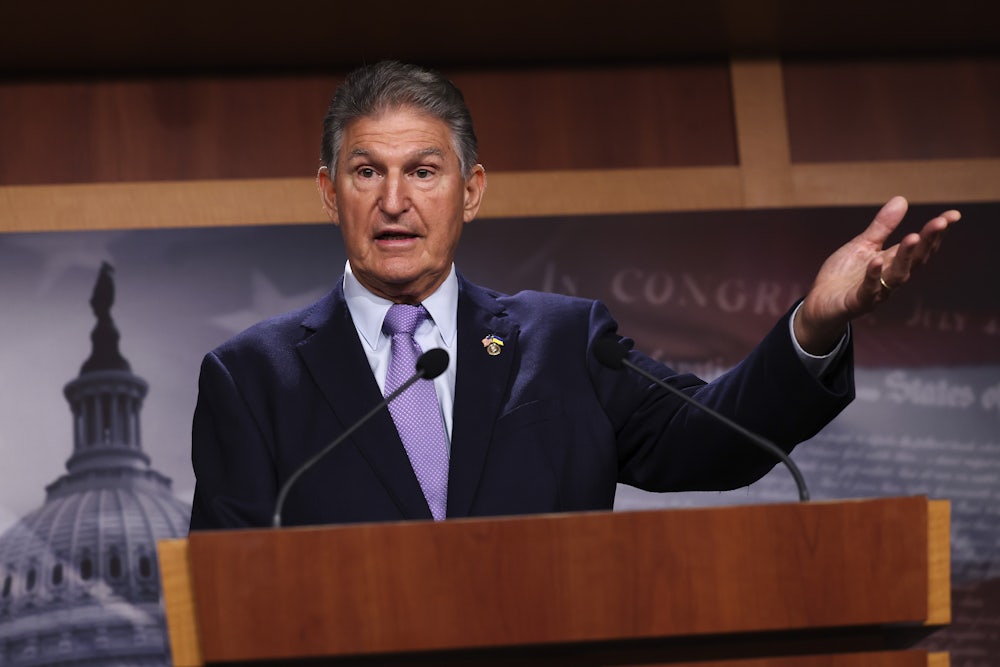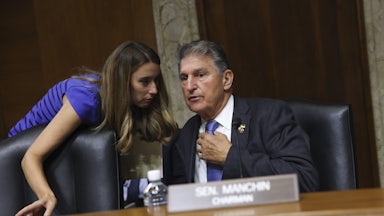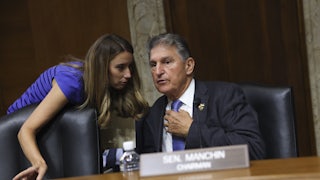When Senate Majority Leader Chuck Schumer and Senator Joe Manchin announced a surprise deal to pass a climate, deficit reduction, and health care policy bill in July, that arrangement came with a caveat. Democratic leadership agreed to a September vote on one of the longtime pursuits of the conservative West Virginia Democrat: an energy permitting proposal to expedite the approval of new projects. If you were excited to see Congress finally moving legislation over the summer, get ready for Stuck Senate Fall, as drama over this deal may upend the final few days before lawmakers go home to campaign.
Earlier this week, Manchin introduced legislation to streamline environmental reviews—including, controversially, authorization for the Mountain Valley Pipeline. Approval for the natural gas pipeline, which would run through Manchin’s home state of West Virginia, was explicitly built into Manchin’s legislation.
Democratic leadership in Congress and the White House quickly coalesced behind Manchin’s proposal, which came after his fellow senator from West Virginia, Republican Shelley Moore Capito, introduced her own measure. “Today, far too many energy projects face delays—keeping us from generating and shipping critical, cost-saving clean energy to families and businesses across America,” White House press secretary Karine Jean-Pierre said in a statement. “This is an important step forward to further unlock the potential of these projects and the good-paying jobs they support.”
Capito also lent her support to Manchin’s legislation, thanks to the inclusion of the Mountain Valley Pipeline authorization. Schumer has repeatedly insisted that Manchin’s legislation will be attached to the continuing resolution, or C.R., to keep the government funded. The Senate will vote early next week to advance a shell bill for the C.R., with text to be included at some amorphous point in the near future. Without congressional action, government funding will expire at the end of the month. Congress is widely expected to pass a C.R. to keep the government funded through mid-December. Governing!
But it will not be smooth sailing for a C.R. with permitting reform attached, as it faces skepticism and even some outright hostility from members on both sides of the aisle. While no one wants a government shutdown, a C.R. would require 60 votes to advance—and, at this point, it’s unclear whether some lawmakers may withhold their vote due to opposition to Manchin’s legislation.
Republicans prefer Capito’s bill to Manchin’s. Moreover, many of them are still steaming after Manchin cut the deal with Schumer to pass the Inflation Reduction Act, and would rather not hand the West Virginia Democrat another win. “I’m hearing that the Republican leadership is upset and they’re saying, ‘We’re not going to give a victory to Joe Manchin,’” Manchin said in a press conference on Tuesday. “If they’re willing to say we’re going to close down the government because of a personal attack on me or basically not looking at the good of the country—this is what makes people sick about politics. It makes me sick about it.”
Meanwhile, several progressives have also expressed their frustration with the measure, arguing that it should be separated from the C.R. Eight Democratic senators sent a letter to Schumer on Thursday arguing that “such important issues should be examined through detailed committee consideration and a robust floor debate separate from the urgent need to see that the government stays open.” Dozens of House progressives have warned that they may not vote for a C.R. with Manchin’s proposal attached, meaning that Democratic leadership would have to rely on Republican votes to pass it in the House—far from a certain prospect.
“The very fact that this fossil fuel brainchild is being force-fed into must-pass government funding speaks to its unpopularity. My colleagues and I don’t want this. The communities that are already hit hardest by the fossil fuel industry’s messes certainly don’t want or deserve this. Even Republicans don’t want this,” Representative Raúl Grijalva, the chair of the Natural Resources Committee who has spearheaded House opposition to Manchin’s proposal, said in a scathing statement on Tuesday. “I urge leadership to listen to the many members asking to keep this out of a Continuing Resolution and avoid a shutdown standoff this country doesn’t need.”
Senator Bernie Sanders has perhaps been the most vocal senator in his disdain for the permitting reform measure, sending a letter to colleagues on Friday urging them to “oppose the big oil side deal.” “It should be the subject of hearings that receive input from climate scientists, environmental experts and the communities impacted by the legislation. It should not be attached to must-pass legislation with no public scrutiny,” Sanders wrote.
“I’ve never seen stranger bedfellows than Bernie Sanders and the extreme liberal left siding up with the Republican leadership in the caucus,” Manchin grumbled in his Tuesday press conference.
But it isn’t only progressives expressing concerns about the bill. Senator Tim Kaine in particular outlined his opposition to the language authorizing the Mountain Valley Pipeline, which would cross through his state of Virginia as well. Kaine told me on Thursday that he could support “86 pages of the 91-page bill” but could not vote for a bill green-lighting the pipeline “with no administrative or judicial review.”
“Chuck cut the deal without talking to me,” Kaine said. “I was hoping that, before the bill was final, that if I told them the concerns I had, then the final product would address my concerns. It doesn’t.” Kaine told me that he believed there could be some kind of separate bipartisan bill on permitting reform, but also didn’t go so far as to say that he would not vote for a C.R. that included Manchin’s bill. “I’m not threatening anything. I’m just telling people I got a major objection to it,” he said.
For his part, Senator Mark Warner, Kaine’s colleague from Virginia, said in a statement that “the process around the Mountain Valley Pipeline stinks.” “In the coming days, I’m going to work with my colleagues to see if we can’t make some reasonable fixes while we work to keep the government up and running,” Warner said.
Some Democrats have expressed support for the bill, noting that it would expedite transmission pipelines to send clean energy to rural population centers. “I continue to support it because I believe that transmission is going to be one of the biggest challenges in the deployment of clean energy,” Senator Brian Schatz told reporters, arguing that a transition to clean energy “won’t work if transmission lines take 15 years to permit.”
A new report by the REPEAT Project at Princeton University, released Wednesday, found that the Inflation Reduction Act could significantly cut greenhouse gas emissions by 2030, but only with the speedy expansion of electricity transmission. “To achieve IRA’s full emissions reduction potential, new clean electricity must be rapidly added to both meet growing demand from electrification and reduce fossil fuel use in the power sector. Constraining transmission growth severely limits the expansion of wind and solar power,” the report found. But some environmental experts have raised concerns that, if greenhouse gas and coal-powered projects are also expanded, that could undercut the progress made by the Inflation Reduction Act to cut emissions. Other critics argue that the backroom dealing that produced the permitting measure is not exactly a shining example of government transparency.
Despite the agita, Schumer staunchly insisted this week that the permitting proposal would remain attached to the C.R. “The permitting reform is part of the [Inflation Reduction Act], and I intend to add it to the C.R. and get it done,” he said in a press conference on Tuesday. “There’s no reason Republicans shouldn’t support it.” Whether Democrats will support it is another problem.










